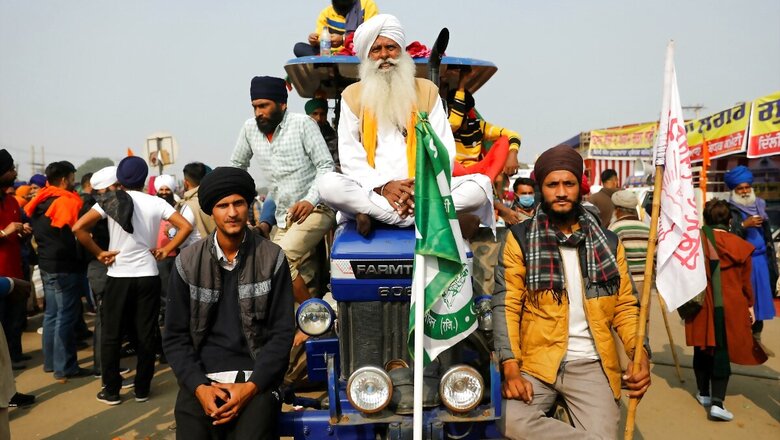
views
New Delhi: While the government drags its feet over farmers’ demand for repeal of the three reforms-oriented Farm Acts, several political parties opposed to the National Democratic Alliance (NDA) have jumped on the agitating farmers’ bandwagon.
United Progressive Alliance constituents, who have in the past favoured reforms, have also backed the nationwide protest against “anti-farmer’’ Acts, displaying a political compulsion to be visible and relevant in this historic battle.
Not just political parties, several sections of the society including trade unions, banking unions, transporters and traders, railway unions, All-India Railway men’s Federation and the Bar Council have supported the farmers’ call for Bharat Bandh today.
When three rounds of talks with central government ministers failed to yield results, the protesting farmers, who have laid a siege to Delhi, gave a call for nation-wide lockdown (Bharat Bandh) to press their demand for repeal of the three Acts that together provide for setting up of private markets, contract farming and lifting of stock holding limits signaling corporatization of agriculture to the disadvantage of small and marginal cultivators who comprise over 80 per cent of all farmers. They are also opposing the privatisation of state electricity boards as proposed by the Electricity (Amendment) Bill, 2020 as it will affect input costs in agriculture.
Just the fact that the price of diesel touched Rs 73.61 per litre and the price of petrol was Rs 83.41 per litre in Delhi on Sunday, should have been enough for opposition parties to raise a storm. But there has been no sign of any Opposition concern for common citizens or the farmers for whom diesel is a crucial input in running of water pumps and transportation of their produce. In fact their fight for mandatory payment of minimum support price for their produce among other things, is to make agriculture sector viable.
Instead of leading the campaign — farmers being strong electoral constituent in rural India — opposition parties have become followers. Had the Opposition been united and really concerned about farmers’ welfare, they would have protested the government taking the Ordinance route over the three Farm Bills at a time when the country was grappling with Covid-19 pandemic and the economy was sluggish. They could not even get the Bills referred to Parliamentary committees for all-party scrutiny, as is the norm.
The priority for political parties appears to be to `Save Our Souls’, be it in Maharashtra, Madhya Pradesh, Bihar (that faced elections/by-elections) or even West Bengal, where Assembly polls are slated for next year. Every political leadership is busy trying to retain or attain power. For instance, none of the political parties including the BJP have a vibrant Kisan Cell that can take up issues of farmers in a meaningful manner. Every unit follows the party line, many times displaying a disconnect with ground reality.
A beleaguered Congress party grappling with internal squabbling gave a call for opposition unity after the farmers protest gathered momentum, but lost the high moral ground over its election manifesto declaration in 2019 to do away with the State Agriculture Produce Marketing Committee Acts under which designated mandis are set up. The party has been using waiver of farm loans as a short-term measure for winning elections be it the 2009 Lok Sabha election or the 2018 Assembly elections in Madhya Pradesh, Chhattisgarh and Rajasthan, but without proper follow-up on implementation.
In Punjab, the current crisis took a political turn over the tussle between the ruling Congress dispensation and the opposition Shiromani Akali Dal (SAD) to score Brownie points with farmers. Each side tried to outdo the other. Union Food Processing Minister Harsimrat Kaur Badal (SAD) resigned from the union council of ministers and her party came out of the National Democratic Alliance, while Punjab Chief Minister Amarinder Singh (Congress) enacted a State law to negate the Central Law as evidence of his concern for farmers.
But farmers mean business. They have come knocking on Prime Minister Narendra Modi’s door from all corners of the country to assert their right and make themselves heard. “Enough is enough,’’ say farmers who are seeking total repeal of the three Acts, namely, the Farmers’ Produce Trade and Commerce (Promotion and Facilitation) Act, 2020 on private markets; the Farmers (Empowerment and Protection) Agreement on Price Assurance and Farm Services Act, 2020 on contract farming; and the Essential Commodities (Amendment) Act, 2020 lifting stockholding limits.
Having shunned dialogue process with States and stakeholders prior to promulgating the three Ordinances, the central government is now facing a challenge in opening communication channels to get through to farmers on the Acts.
Farmers maintain that the reforms initiated by the central government through the three Farm Acts are headed towards privatization of markets, dismantling of the Food Corporation of India (that procures foodgrains from farmers and stores) and a public distribution system catering only to Below Poverty Line population. This will subsequently lead to provision of food coupons or cash payments to the poor to buy subsidized foodgrains from a free market.
The second generation of dynastic politics of various parties, who were born with a silver spoon in their mouth and long migrated out of rural areas, seems barely conversant with prolonged and deep-rooted struggles of farmers and farm labour to make a decent living. And that is the tragedy of today’s farmers: They lack leaders of the stature of Choudhary Charan Singh, Ch. Devilal or a Ch. Mahendra Singh Tikait who could strategise, hold sway with the government of the day and lead them to triumph.
This farmers’ movement on the three Farm Acts is spontaneous, apolitical and leaderless, and therefore, must be handled with care.
Read all the Latest News, Breaking News and Coronavirus News here
















Comments
0 comment